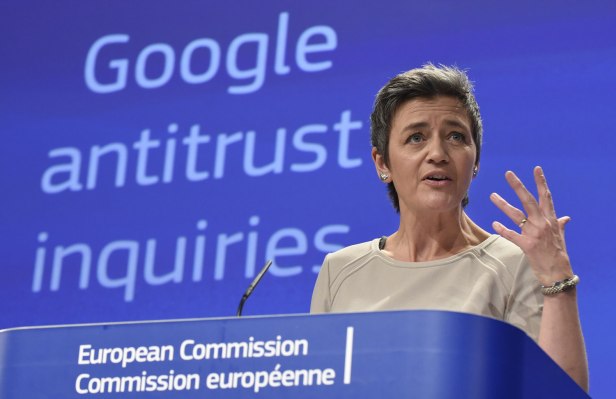EU’s new rules for Big Tech to come into force next Spring – TechCrunch
The European Union’s flagship reform for tackling Big Tech platform power, the Digital Markets Act (DMA), will come into force in early 2023, Commission EVP Margrethe Vestager has said — rowing back from an earlier suggested timeframe of this fall.
But she also implied that enforcements against unruly Internet “gatekeepers” could flow soon after the regulation is in place.
“The DMA will enter into force next spring and we are getting ready for enforcement as soon as the first notifications come in,” Vestager said today in a speech to the International Competition Network conference in Berlin.
“This next chapter is exciting. It means a lot of concrete preparations,” the EU’s competition chief went on. “It’s about setting up new structures within the Commission, pooling resources from DG Comp [Directorate-General for Competition] and Cnect [Directorate-General for Communications] based on relevant experience. It’s about hiring staff. It’s about preparing the IT systems. It’s about drafting further legal texts on procedures or notification forms. Our teams are currently busy with all these preparations and we’re aiming to come forward with the new structures very soon.”
EU lawmakers reached political agreement on the ex ante regulation back in March, paving the way for full adoption later this year of a draft law which was only proposed by the Commission at the end of 2020 — underscoring how much consensus there is across the bloc’s institutions of the need to rein in Big Tech.
However there has been some concern that the Commission will not be immediately ready for the new, centralized enforcement role it’s taking on as the DMA’s ‘sheriff’ of Big Tech — a role which will consist of assessing whether platform giants are sticking to the ex ante regulation’s long list of up-front ‘dos and don’ts’, which cover detailed (and sometimes technically complex) compliance obligations related to issues such as self-preferencing, FRAND terms, interoperability and portability, to name a few.
The Commission will also be responsible for taking effective enforcement action to bring any obligation-breaching gatekeepers quickly into line.
The tech giants that will be subject to the DMA have not yet been designated. But the criteria of “a core platform service” with “significant” impact on the EU’s internal market; a market capitalisation of at least €75BN (or an annual turnover of €7.5BN); at least 45M monthly end users in the EU and 10,000+ annual business users, as well as an entrenched market position means the usual GAFAM giants are certainly in the frame.
Vestager herself has previously implied the task of effectively enforcing the incoming rules against such well-resourced tech giants will be difficult — citing, earlier this year, the ongoing tug-of-war between the Netherlands’ antitrust authority and Apple over App Store rules — so her remarks today may be intended to subtly correct any perceived lack of confidence in the Commission’s understanding of its mission.
The slightly longer lead in time for the DMA coming into force also gives the EU more time to get properly ready, of course.
But more prep times inevitably means a longer runway before any enforcement is possible — which may redirect fresh criticism at the Commission as any delay in addressing glaringly obvious Big Tech breaches will bolster the critique that the EU failed to take the mission seriously enough for the legislation to have the sought for impact of ensuring digital markets remain (or, well, become) open and contestable fast.
The regulation provides for a three month notification period for gatekeepers to declare themselves to the Commission — and up to around two additional months for the EU’s executive body to confirm the designation — so there will still be a multi month period after the DMA enters into force before any enforcements are likely to flow.
Indeed, it could be fall 2023 before we see any real fireworks. So the Commission may quickly find itself taking flak that even its new ‘faster’ ex ante regulatory regime isn’t quick enough to put meaningful limits on the ‘move fast and break things’ Big Tech cartel.
Vestager’s speech also only tentatively frames the EU as being perhaps “slightly ahead” on the global stage when it comes to laying “the future of digital markets” with a “hybrid approach… in which both ex ante regulation and traditional competition tools will both play their part”.
Is that more subtle managing of expectations on her part? EU citizens can only wait to find out — but how long the Commission will leave consumers and markets waiting for DMA enforcement is the killer question.
A big chunk of Vestager’s speech at the ICN conference also focused on the need for wide-ranging cooperation between competition regulators to, as she argued it, effectively tackle the challenges posed by digital markets — a theme she’s often talked up before. Although cynics might say that linking the EU’s success here to global alignment with its regulatory approach smacks of pro-active buck passing — especially given the competition commissioner’s long stated preference for less radical remedies for tackling platform power in digital markets vs the stronger medicine of actually breaking tech giants up.
“For that next chapter, close cooperation with competition authorities, both inside and outside the EU will be crucial,” she emphasized today. “This is irrespective of whether they apply traditional enforcement tools or have developed their own specific regulatory instruments, like the German digital regulation. Close cooperation will be necessary because we will not be short of work and we will not be short of novel services or practices to look at. And the efforts needed at a global scale are enormous. So we will need to work together more than ever.”
Vestager suggested cooperation is already happening as part of preparatory work for the DMA — which she said will involve “discussing with national competition authorities our future cooperation within the DMA, as well as coordination between the DMA and existing national regulations”.
“Many of you will be watching the roll out of the DMA with great interest. This will be a mutual learning experience. The EU has worked hard to find the right balance, and I think we have come up with something that is tough but also very fair,” she also said, before schooling her audience that: “It goes without saying that the more we, as an international competition community, are able to harmonise our approach, the less opportunity there will be for global tech giants to exploit enforcement gaps between our jurisdictions.”




